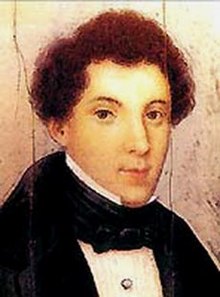Juan Crisóstomo de Arriaga
Juan Crisóstomo de Arriaga , with full name Juan Crisóstomo Jacobo Antonio de Arriaga y Balzola , (born January 27, 1806 in Rigoitia ( Bilbao ), † January 17, 1826 in Paris ) was a Spanish (Basque) violinist and composer .
Life
Arriaga came from a wealthy musical family and proved to be a precocious talent both as a violinist and as a composer, which is why he was also referred to as the Spanish Mozart . Before he was 15, he was already composing the opera Los esclavos felices , which was also performed in his hometown of Bilbao . In 1821 he went to the Paris Conservatory , where he received further violin lessons from Pierre Baillot and was trained in harmony and counterpoint from François-Joseph Fétis . Due to his amazing talent, Arriaga became Fétis' assistant in his composition class as early as 1824.
Arriaga died of tuberculosis shortly before his 20th birthday , was soon forgotten and was only rediscovered with the rise of Spanish nationalism at the end of the 19th century.
The three string quartets are considered to be his most important works . Published in Paris in 1824 - Arriaga was only 17 - they are the only works that were published during his lifetime. Stylistically, they stand between Haydn and Mozart, but also have echoes of the early Beethoven . In doing so, Arriaga found his own tonal language, which, despite the strictness of form (use of counterpoint), can be characterized as elegant, light and melodious. Musically striking are the similarities to Franz Schubert's work (major-minor changes in the same key), also in terms of tonality; it is not known whether Arriaga knew about Schubert.
He also composed Erminia, scène lyrique-dramatique (after Tasso , 1821-26), a symphony in D major ( Sinfonía a gran orquesta , 1824) and various chamber music works and church music (Stabat mater, 1821-26).
Web links
- Works by and about Juan Crisóstomo de Arriaga in the catalog of the German National Library
- Sheet music and audio files by Juan Crisóstomo de Arriaga in the International Music Score Library Project
- String quartets No. 1 and No. 2 the european archive http://www.europarchive.org
Individual evidence
- ↑ a b Clive Unger-Hamilton, Neil Fairbairn, Derek Walters; German arrangement: Christian Barth, Holger Fliessbach, Horst Leuchtmann, et al .: The music - 1000 years of illustrated music history . Unipart-Verlag, Stuttgart 1983, ISBN 3-8122-0132-1 , p. 113, 116 .
| personal data | |
|---|---|
| SURNAME | Arriaga, Juan Crisóstomo de |
| ALTERNATIVE NAMES | Arriaga y Balzola, Juan Crisóstomo Jacobo Antonio de (full name) |
| BRIEF DESCRIPTION | Spanish violinist and composer |
| DATE OF BIRTH | January 27, 1806 |
| PLACE OF BIRTH | Rigoitia (Bilbao) |
| DATE OF DEATH | January 17, 1826 |
| Place of death | Paris |

